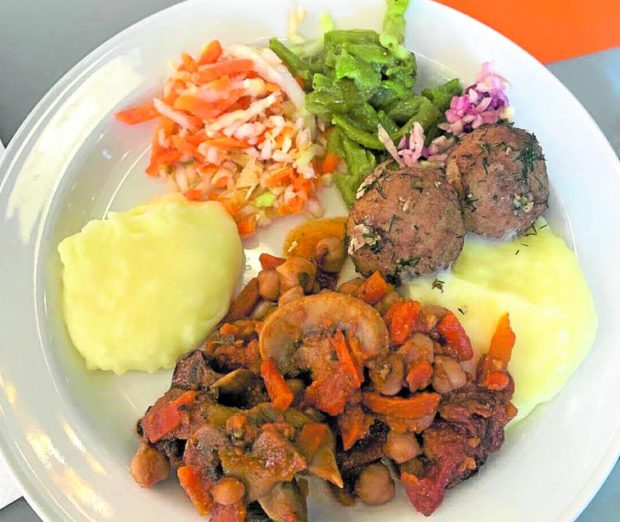In Finland, school meals keep students going

BALANCED Students of Viikki Teacher Training School in Helsinki, Finland, are given balanced meals, like this plate full of nutritious food, as part of the national core curriculum in their country. —JANE BAUTISTA
(Last of two parts)
HELSINKI — Free school meals are a staple in Finland, a country widely recognized for having one of the best educational models in the world, as authorities believe that ”a hungry child is less likely to concentrate and more likely to drop out of school.”
Ville Skinnari, Finnish minister for development cooperation and foreign trade, said that school meals were initially introduced to address poverty and malnutrition during World War II.
More than 70 years since then, Finland holds the record for the world’s longest-running free school feeding system, wherein all students attending preprimary, basic and upper secondary education are provided a healthy and balanced meal every school day.
It also seeks to expand the program to other countries. “The goal is for every boy and girl in this world to get a school meal by 2030. I know it sounds ambitious but we are very committed to working as a school meals ambassador,” Skinnari told foreign media during a visit to Helsinki last week.
Article continues after this advertisementTo achieve this goal, Finland co-chaired with France the establishment of the School Meals Coalition, an initiative launched in September 2021, aimed at helping governments and other partners reestablish and improve food and education systems worldwide.
Article continues after this advertisementThe Philippines, through former Education Secretary Leonor Briones, has pledged its commitment to the coalition, together with around 70 other nations.
Skinnari said they were set to hold the coalition’s first ministerial meeting this week in Helsinki “to discuss the coalition’s future plans and we look forward to concentrating on the concrete deliverables on enhancing school meals at the global level.”
While Finland spends around 2.8 euros (P160) per child for school meals, the Philippines’ school-based feeding program allocates around P20 for each qualified student.
“School meals [are] an integral part of the national core curriculum,” said Marjaana Manninen, senior adviser of the Finnish National Agency for Education, which is mainly responsible for developing the guidelines and curriculum for schools.
“National policies require that schools provide obligatory nutrition and cooking lessons in home economics, classes and health education. Our basic education act says that pupils attending schools must be provided with a properly organized and supervised balanced meal free of charge every school day,” she said.
It is a responsibility shared with local authorities because after the Finnish National Agency for Education develops the curriculum, municipalities “take over” and create a local curriculum to describe the objectives for education in health, nutrition, sustainability, and table manners.
“We give the guidelines and the municipalities give the practical part of the curriculum,” Manninen said.
Unlike in the Philippines, the Finnish school feeding system is decentralized, which means the planning and organization of school meals lie with municipalities and other education providers.
The setup of the country’s school meal system is like a buffet catering service.
During the designated meal time, students, under the supervision of the school staff and teachers, get their own plate, food and drink (milk or water) and eat with their classmates for at least 30 minutes.
“In addition, it’s recommended that the pupils have the opportunity to spend 10 or 15 minutes outside for some exercise before or after the meal time,” Manninen said.
One-plate model
“We have a one-plate model — we don’t eat salad on a separate plate because we put everything on one plate. School meals [are] a pedagogical tool for teaching good nutrition and eating habits as well as to increase the consumption of vegetables,” she added.
According to Manninen, school meals in Finland are more than just about nutrition, they are also part of the daily teaching environment and the educational task is defined in the core curriculum.
“The successful implementation of school meals requires cooperation on a multidisciplinary level and between different stakeholders,” she said, adding that the school catering not only involves teachers and the school staff but also parents and the students themselves.
“Mealtime is an important part of the school day for pupils and they are also encouraged to take part in the planning, implementation, and evaluation of school meals and the meal breaks,” she said.
The basic education core curriculum in Finland is structured in a thematic way that carries pedagogical questions like “What” (getting to know the topic); “How” (activities like learning by eating); and “Why” (which answers the importance of eating the meal in a certain time).
“First they learn that they have to eat, they know what to eat and then follow different models. They train by themselves in cooking lessons in home economics and later they understand the ecosystem of food,” Manninen said.
To ensure the overall well-being of every student, municipalities are required to make sure that schools provide free annual health examinations and personalized advice on mental health, healthy eating, and physical fitness.
RELATED STORY